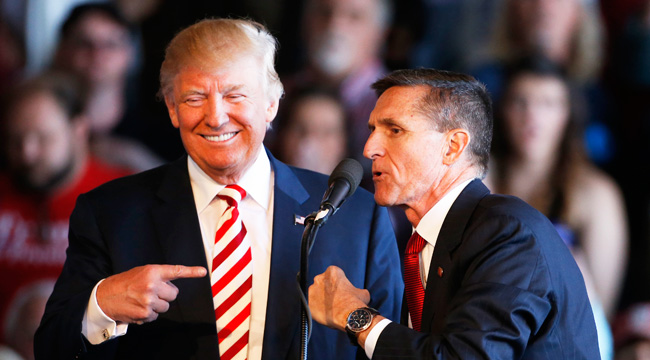
In light of Gen. Michael Flynn’s Monday night resignation as national security advisor, much of Sean Spicer’s daily White House press briefing on Tuesday was dedicated to the matter. “Spicey” began by addressing the matter head-on, telling reporters “the level of trust between [President Donald Trump] and Gen. Flynn had eroded to the point where he felt he had to make a change,” especially since there were concerns Flynn “had misled the vice president and others.” Yet as CNN’s Jim Acosta, the New York Times, and other attentive members of the media noted, what Spicer was saying and what reportedly happened weren’t matching up.
According to what Spicer told reporters, the process of reviewing Flynn’s behavior began “immediately after the Department of Justice notified the White House counsel of the situation.” As a result of said notification, “the White House counsel briefed the President and a small group of senior advisers.” The problem? As the Washington Post noted, former Acting Attorney General Sally Yates — whom Trump relieved in late January — and a “senior career national security official” were the ones who informed Trump’s White House counsel of their concerns regarding Flynn’s behavior.
In other words, the president and his team know about the issues stemming from Flynn’s allegedly inappropriate communcations with the Russian ambassador weeks before he resigned on Monday. That, and one of the people who informed him of the situation was Yates, the same person Trump asked to resign following her decision as acting attorney general not to enforce his immigration ban.
Meanwhile, CNN’s White House correspondent Jim Acosta (of “you’re fake news” fame) took issue with Spicer’s statement during the subsequent Q&A and on Twitter, saying the claim that Trump “asked” for Flynn’s resignation was “not consistent with what top officials told reporters.” Neither was Spicer’s declaration that Trump “had been incredibly tough on Russia,” which Acosta contended was also “not consistent with the record.”
During the briefing, Acosta brought these inconsistencies to the foreground when he asked Spicer how it was “possible” that Trump had been so tough considering his previous statements. “He has made comment after comment over the course of the campaign [and] the transition,” said Acosta, “where he defended Vladimir Putin” and other relevant items of concern. Spicer retorted he’d “just walked through” his answer to Acosta’s question, which was how and why Trump was tough on Russia, but didn’t address the particulars of the reporter’s counterexamples.
Spicer said Trump has been tough on Putin.@Acosta: “How is that possible?”
Spicer says POTUS understands healthy r’ship is good for US pic.twitter.com/SMlqTXSMRa
— Steve Kopack (@SteveKopack) February 14, 2017
(Via New York Times, Washington Post, CNN and MSNBC)
